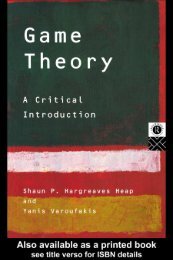handbook-executive-leadership-of-research-development-pdf-v10
handbook-executive-leadership-of-research-development-pdf-v10
handbook-executive-leadership-of-research-development-pdf-v10
You also want an ePaper? Increase the reach of your titles
YUMPU automatically turns print PDFs into web optimized ePapers that Google loves.
Principle 3. Create a competitive environmentA defining feature <strong>of</strong> <strong>research</strong>-intensive universities is a meritocratic culture in whichexcellence is pursued through rewarding success. As the international and nationalcontext for <strong>research</strong> has become increasingly competitive, these universities haveincreased their support for those interdisciplinary teams and <strong>research</strong> centres that areable to compete on the world stage in order to maximise their advantage. Researchproductivity is very unequally distributed. The fact that most <strong>research</strong> is produced by asmall proportion <strong>of</strong> academics is testimony to its highly competitive character.When linked to an inspiring vision and systems for assessing progress towardsthe university’s <strong>research</strong> ambitions, strong-minded <strong>research</strong> performance goals– including aspirations to increase <strong>research</strong> income – help to reinforce a sense <strong>of</strong>collective responsibility for raising <strong>research</strong> activity and outputs in the context <strong>of</strong>external competition.What it means in practiceEstablish <strong>research</strong> management systems that mirror the externalenvironmentCreating a culture in which every member <strong>of</strong> staff takes <strong>research</strong> seriously willrequire internal systems that reflect external ones. Clear expectations <strong>of</strong> what countsas <strong>research</strong> performance must be established. Internal <strong>research</strong> grants should bedistributed through a process <strong>of</strong> strict merit-based allocation. Weaker applicantsshould have access to support to improve their applications; under no circumstancesshould there be an equal distribution <strong>of</strong> resources. Research support <strong>of</strong>fices needto echo this competitive environment through maintaining systems that target teamsand individuals that are successful and those that show clear promise <strong>of</strong> success.“While it’s tempting to do veryserious strategic plans and SWOTanalyses (they are importantelements) <strong>of</strong>ten aspects <strong>of</strong> culturalchange come about by small wins.”Some key actions are required in the very earlystages <strong>of</strong> change to shift the culture from one<strong>of</strong> entitlement to competition. These includeapplying the same <strong>research</strong> grant assessmentcriteria and evidence regimes as are used fornational and international grant applications, and raising expectations about thequality and quantity <strong>of</strong> <strong>research</strong> outputs and the forums for dissemination <strong>of</strong> findingsto international standards. It also means setting challenging performance targets forfaculties and <strong>research</strong> centres.Focus 2 — Taking an assertive-participative approach to <strong>leadership</strong>39



